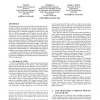Free Online Productivity Tools
i2Speak
i2Symbol
i2OCR
iTex2Img
iWeb2Print
iWeb2Shot
i2Type
iPdf2Split
iPdf2Merge
i2Bopomofo
i2Arabic
i2Style
i2Image
i2PDF
iLatex2Rtf
Sci2ools
142
Voted
SWS
2004
ACM
2004
ACM
A formal semantics for P3P
The Platform for Privacy Preferences (P3P), developed by the W3C, provides an XML-based language for websites to encode their datacollection and data-use practices in a machine-readable form. To fully deploy P3P in enterprise information systems and over the Web, a well-defined semantics for P3P policies is a must, which is lacking in the current P3P framework. Without a formal semantics, a P3P policy may be semantically inconsistent and may be interpreted and represented differently by different user agents; it is difficult to determine whether a P3P policy is indeed enforced by an enterprise; and privacy policies from different corporations cannot be formally compared before information exchange. In this paper, we propose a relational formal semantics for P3P policies, which precisely and intuitively models the relationships between different components of P3P statements (i.e., collected data items, purposes, recipients and retentions) during online information collection. The pro...
Related Content
| Added | 30 Jun 2010 |
| Updated | 30 Jun 2010 |
| Type | Conference |
| Year | 2004 |
| Where | SWS |
| Authors | Ting Yu, Ninghui Li, Annie I. Antón |
Comments (0)

